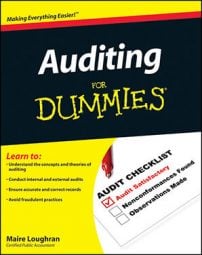You’ll hear auditors referring to the triangle of fraud. That’s because in most fraudulent acts, three circumstances lead to the commission of fraud: the incentive to commit fraud, the opportunity to carry out the fraudulent act, and the ability to rationalize or justify the fraud.
Identifying incentive
Management usually perpetrate fraud differently from nonmanagement employees, For nonmanagement employees, incentive takes place when an employee has an overriding reason to steal from the company. Sometimes the employee has bills she can’t pay or a money-sucking addiction. Many times the incentive springs from not wanting a spouse, child, or parent to know about the problem. The employee resorts to self-help rather than risk being embarrassed by admitting that her debt is out of control.
Here are some red flags to consider when looking for fraud among non-management employees:
The employee’s spouse has lost a job.
The employee is divorced and has expensive child or spousal support payments.
The employee or his spouse or child is involved in civil or criminal proceedings.
The employee has a drug, alcohol, or gambling problem.
The employee purchased a new home with an accelerating variable rate mortgage.
The employee never takes a vacation (in an attempt to conceal the fraud).
To identify at-risk employees, consider whose paychecks are being garnished by the court system in order to pay for child support or alimony. Also, look at payroll records to see who has accrued substantial vacation or sick leave.
Managers are often motivated to commit fraud because of the way they’re compensated. For example, a department manager may be angling for a higher raise at year’s end. How well each department performs could be upper management’s method of allocating available bonuses to the managers. A common performance measure is comparing actual department expenses to the budget.
People in upper management often have a relatively low salary with the bulk of their compensation coming from bonuses tied to company results.
Recognizing opportunity
Regardless of the strength of the incentive, fraud can take place only if the opportunity is present. The opportunity for fraud can come from many different directions:
Weak internal controls: Strong internal controls are a business’s first line of defense.
No separation of duties: This occurs when one employee handles many different related tasks. For example, the same employee opens the mail, logs in payments, and prepares and takes the deposit to the bank.
Indifferent management: Sometimes management doesn’t enforce the internal controls set in place.
Ineffective monitoring of management: This takes place when the company is small and has few managers.
Keep in mind that collusion among employees can circumvent even the strongest of internal controls.
Recognizing rationalization
Think back to any less-than-optimal decision you’ve ever made. Usually, the more harum-scarum the decision, the more you had to talk yourself into the wisdom of going down that rocky road. Employees go through the same process to justify fraud — at least to themselves.
Among smaller clients, the employee’s rationale is usually that he works harder than the owner. In the employee’s eye, the owner is vastly overpaid, and, therefore, a little fraud on the part of the employee levels the playing field.
A major red flag of rationalization on the part of management is firing or forcing an auditor to withdraw from the engagement. When the company starts telling the auditor how to do the job, that’s the ultimate in rationalization.
Here are some other common rationalizations:
“I’m just borrowing the money.” This one tops the list. The employee sometimes does have the best of intentions to replace the stolen funds. However, there’s a snowball effect. The longer the employee gets away with the fraud, the more casual she becomes about the situation. The fraud usually escalates to the point where the employee is unable to pay back the stolen money.
“They done me wrong.” Some event, such as being passed over for a promotion, leads the employee to feel that taking home company assets is his right.
“There’s no other way to manage my problems.” The employee believes he’ll lose everything dear to him, including his home and family, unless he steals the money.

